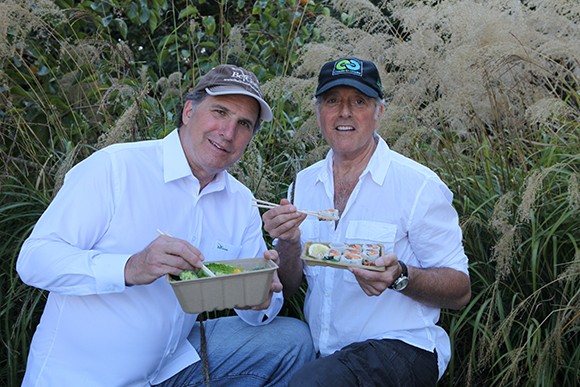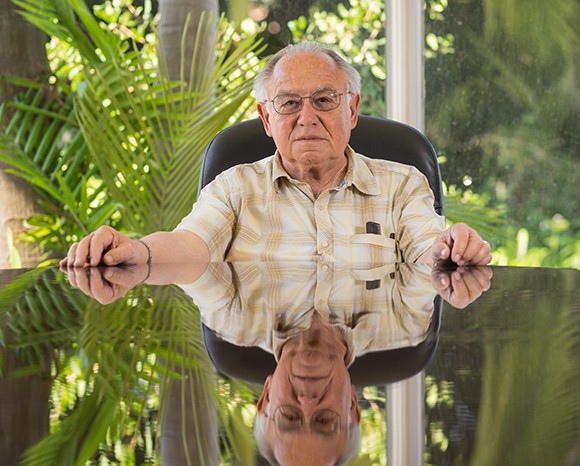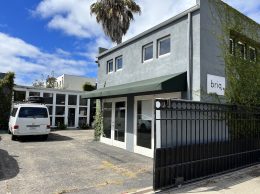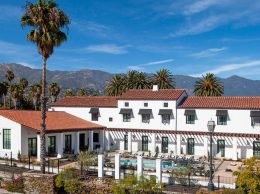20 years of honoring innovation: Business & Technology honorees announced
IN THIS ARTICLE
- Features Topic
- Stephen Nellis Author
By Stephen Nellis Friday, April 11th, 2014

BeGreen Packaging CEO and President Ron Blitzer, left, and President of Manufacturing Robert Richman. The company, which makes renewable packaging for food and consumer products, is honored this year by the South Coast Business & Technology awards. (courtesy photo)
The South Coast Business and Technology Awards, the largest business networking and educational fundraising event in the region, will honor a green packaging company, a drought-resistant seed company and a rescue equipment maker, among others, as it celebrates its 20th year.
The dinner regularly draws more than 600 leaders from the civic, nonprofit and business worlds each year. Organized by the Scholarship Foundation of Santa Barbara, this year’s event is expected to raise more than $130,000 for scholarships that will be awarded to students who are working toward business or technology degrees at UC Santa Barbara, Santa Barbara City College, and Westmont College. Over the years, the dinner has raised nearly $1.5 million in scholarships for 600 students.
This year’s winners are: CMC Rescue, receiving the Excellence in Service Award; Victor Schaff, honored as the Entrepreneur of the Year; Be Green Packaging, awarded the Company of the Year title; Craig Zimmerman, named Executive of the Year; and Herb Kroemer, receiving the Pioneer Award.
CMC rescue

Goleta-based CMC Rescue makes equipment and provides training for search-and-rescue teams. (courtesy photo)
CMC Rescue was founded by Jim Frank in 1978. he had a background in engineering and also volunteered with search and rescue teams in Santa Barbara County. He realized that most climbing gear was made for sports purposes and wasn’t adequate to support the weight of two people during a rescue operation. So he decided to fulfill the need himself. “It really wasn’t started with the idea that it would be a profitable business and make money,” said current CEO Rich Phillips. “It was started with the idea that somebody needs to do this to help rescue people.”
Since then, the company’s gear has been adopted by emergency personnel around the globe. CMC also launched training programs in the use of its rescue gear that have drawn participants as diverse as the National Park Service and utility companies.
In the meantime, CMC Rescue has done its manufacturing in Santa Barbara and exported products around the world. In recent years, the company bought its own building so that it would be able to stay planted in the Tri-Counties and shifted to an employee-ownership model. That gave Frank, who remains chairman of the board, the chance to exit the business while ensuring that longtime loyal employees would be taken care of and that the company would remain active in the community.
“The business was founded on the basis that a company should be able to do everything right and not cut any corners,” Phillips said. “Everybody who works here comes into that culture and sees it as something special. It just has a feeling that we’re doing something worthwhile that the world needs.”
Victor Schaff

Victor Schaff founded S&S Seeds, the only commercial grower of drought-resistant plants native to California. (Nik Blaskovich / Business Times photo)
Entrepreneur of the Year winner Victor Schaff packed his family into a ‘56 Ford in the mid-1960s to come to UC Santa Barbara. One of his college jobs was collecting and selling lupine flower seeds.
He realized that there was a need for drought-resistant landscaping plants for erosion control along roadways and other projects. He set off with a botanical book in hand and began collecting and selling the native seeds that eventually became the signature product at S&S Seeds.
At the time, Schaff selected native plants because they were naturally adapted to California’s dry conditions. But starting in the 1970s, native plants started to come into demand to as environmentally conscious builders sought to emulate the natural landscape.
“I did not foresee there would be so much emphasis on native species,” Schaff said. “That was related not necessarily to low water but to restoring what was here before we changed the environment with imported materials.”
Over the years, Schaff also became one of the most prolific real estate investors on the South Coast, most recently purchasing the 51,000-square-foot building on the Carpinteria bluffs that Venoco leases for its regional headquarters. “When I was working my way through college, I drove a school bus and a charter bus, and one Saturday one of the mechanics wanted to sell his property very quickly. I was able to purchase it and continued to trade and acquire more properties,” Schaff said.
Be Green Packaging
Company of the Year winner Be Green Packaging has rocketed to prominence since it was founded in 2007 by Robert Richman and Ron Blitzer.
The company created renewable packaging for food and consumer products by using plant fibers from bamboo, the unused parts of sugarcane and other sources. The packaging is “cradle-to-cradle” certified, meaning that its entire life-cycle has been analyzed for environmental impacts.
The company started out with its trays in a few region’s of Whole Foods’ network of stores.
“We were trying to come up with a better tray. We were not trying to reinvent how you package the food, but focus on more sustainable materials,” Blitzer said.
Be Green Packaging eventually went nationwide with the Texas chain and now regularly works with Fortune 100 companies such as DuPont and Procter & Gamble. One of the firm’s biggest achievements is in consumer electronics, where it is working with manufacturers to reduce the environmental footprint of packaging.
All of Google’s newest Chromebooks will come in Be Green Packaging’s materials. It also works with HP and Samsung.
Be Green Packaging is building a new production facility in South Carolina. The founders recently sold a controlling stake to private equity firm The Riverside Co., but they have a contract to stay aboard for three years and hope to grow sales to between $150 million and $200 million.
Blitzer said he and Richman set out to change the world and knew that to be successful, they would need to take the company public or sell it “to guys that have more money and can take the company to another level,” he said.
Craig Zimmerman
Executive of the Year winner Zimmerman of the Towbes Group said his entire team deserves the award. The Towbes Group stands out for its low-friction execution of big projects in a notoriously development-adverse region. Zimmerman said that flows from careful selection of projects such as rental housing with affordable units.
“The secret sauce, if you will, is to fill needs the community has with projects the community wants,” Zimmerman said. “There’s a saying around here: Some of the best deals are the deals we walked away from. You just can’t take on every development opportunity in Santa Barbara, because some of them the community does not want. Forcing something in the community is not a way to maintain and protect your brand.”
Herb Kroemer
Pioneer Award winner Kroemer is a Nobel prize-winning UCSB physicist. He won the prize in 2000 for his pioneering work in the theory behind semiconductor lasers that helped make fiber-optic communications possible.
The son of working class German parents, Kroemer had discipline problems in school, according to his Nobel biography. When a teacher asked him why he had repeatedly misbehaved, “I told her that I had been bored, whereupon she exploded: ‘Mr. Kroemer, one of the purposes of a higher education is that you learn to be bored gracefully.’ I will never forget that outburst — nor have I ever really learned to be bored gracefully,” he wrote.










